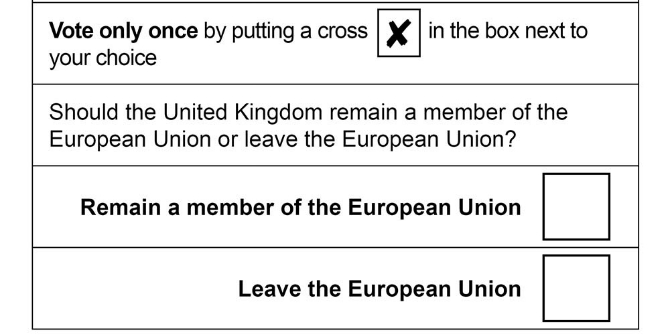 The Brexit referendum question was flawed in its design by ignoring Kenneth Arrow’s impossibility theorem, writes Thomas Colignatus. As he explains, referendums can be considered democratically legitimate only if voters can make an informed decision. and it is questionable whether the UK’s referendum on the EU produced a sound choice in the first place.
The Brexit referendum question was flawed in its design by ignoring Kenneth Arrow’s impossibility theorem, writes Thomas Colignatus. As he explains, referendums can be considered democratically legitimate only if voters can make an informed decision. and it is questionable whether the UK’s referendum on the EU produced a sound choice in the first place.
Theresa May’s government, with support from the UK Parliament, has adopted Brexit as its policy aim and has invoked Article 50. Yet, economic theory assumes rational agents, and even governments might be open for rational reconsideration.
The unsatisfactory referendum question
Based upon voting theory, the Brexit referendum question can be rejected as technically unsatisfactory. One could even argue that the UK government should have annulled the outcome based on this basis alone. Even more ambitiously, one might imagine that economists and political scientists across Europe take up this issue and hence provide a basis for the EU Commission to negotiate for a proper referendum question. The big question is why the UK procedures didn’t produce a sound referendum choice in the first place.
Renwick et al. (2016) in an opinion in The Telegraph June 14 protested: ‘A referendum result is democratically legitimate only if voters can make an informed decision. Yet the level of misinformation in the current campaign is so great that democratic legitimacy is called into question’.
Their letter complains about the quality of information available to voters (an issue about which the RES has raised complaints with the BBC). It doesn’t make the point that the UK government, by ignoring voting theory, has posed a very misleading question given the complexity of the issue under decision. Quite unsettling is the Grassegger and Krogerus (2017) report about voter manipulation by Big Data, originally on Brexit and later for the election of Donald Trump. But the key point here concerns the referendum question itself.
 Image (Wikipedia): Public Domain.
Image (Wikipedia): Public Domain.
The problem with the question
The question assumes a binary choice — Remain or Leave the EU — while voting theory warns that allowing only two options can easily be a misleading representation of the real choice. When the true situation is more complex, and especially if it is one that arouses strong passions, then reducing the question to a binary one might suggest a political motivation. As a result of the present process, we actually don’t know how people would have voted when they had been offered the true options.
Compare the question: ‘Do you still beat your mother ?’
When you are allowed only a Yes or No answer, then you are blocked from answering:
‘I will not answer that question because if I say No then it suggests that I agree that I have beaten her in the past.’
In the case of Brexit, the hidden complexity concerned:
— Leave, and adopt an EFTA or WTO framework?
— Leave, while the UK remains intact or while it splits up?
— Remain, in what manner?
Voting theory generally suggests that representative democracy — Parliament — is better than relying on referendums, since the representatives can bargain about the complex choices involved.
Deadlocks can lurk in hiding
When there are only two options then everyone knows about the possibility of a stalemate. This means a collective indifference. There are various ways to break the deadlock: voting again, the chairperson decides, flip a coin, using the alphabet, and so on. There is a crucial distinction between voting (vote results) and deciding. When there are three options or more there can be a deadlock as well. It is less well-known that there can also be cycles. It is even less recognised that such cycles are actually a disguised form of a deadlock.
Take for example three candidates A, B and C and a particular distribution of preferences. When the vote is between A and B then A wins. We denote this as A > B. When the vote is between B and C then B wins, or B > C. When the vote is between C and A then C wins or C > A. Collectively A > B > C > A. Collectively, there is indifference. It is a key notion in voting theory that there can be distributions of preferences, such that a collective binary choice seems to result into a clear decision, while in reality there is a deadlock in hiding.
Kenneth Arrow who passed away on February 21 used these cycles to create his 1951 ‘impossibility theorem’. Indeed, if you interpret a cycle as a decision then this causes an inconsistency or an ‘impossibility’ with respect to the required transitivity of a (collective) preference ordering. However, reality is consistent and people do really make choices collectively, and thus the proper interpretation is an ‘indifference’ or deadlock. It was and is a major confusion in voting theory that Arrow’s mathematics are correct but that his own verbal interpretation was incorrect.
Representative government is better than referendums
Obviously a deadlock must be broken. Again, it may be political motivation that reduces the choice from three options A, B and C to only two. Who selects those two might take the pair that fits his or her interests. A selection in successive rounds as in France at the moment is no solution. There are ample horror scenarios when bad election designs cause minority winners. Decisions are made preferably via discussion in Parliament. Parliamentarian choice of the Prime Minister is better than direct election like for the US President.
Voting theory is not well understood in general. The UK referendum in 2011 on Alternative Vote (AV) presented a design that was far too complex. Best is that Parliament is chosen in proportional manner as in Holland, rather than in districts as in the UK or the USA. It suffices when people can vote for the party of their choice (with the national threshold of a seat), and that the professionals in Parliament use the more complex voting mechanisms (like bargaining or the Borda Fixed Point method). It is also crucial to be aware that the Trias Politica model for democracy fails and that more checks and balances are required, notably with an Economic Supreme Court.
The UK Electoral Commission goofed too
The UK Electoral Commission might be abstractly aware of this issue in voting theory, but they didn’t protest, and they only checked that the Brexit referendum question could be ‘understood’. The latter is an ambiguous notion. People might ‘understand’ quite a lot but they might not truly understand the hidden complexity and the pitfalls of voting theory. Even Nobel Prize winner Kenneth Arrow gave a problematic interpretation of his theorem. The Electoral Commission is to be praised for the effort to remove bias, where the chosen words ‘Remain’ and ‘Leave’ are neutral, and where both statements were included and not only one. (Some people don’t want to say ‘No’. Some don’t want to say ‘Yes’.) Still, the Commission gives an interpretation of the ‘intelligibility’ of the question that doesn’t square with voting theory and that doesn’t protect the electorate from a voting disaster.
A test on this issue involves asking yourself: Given the referendum outcome, do you really think that the UK population is clear in its position, whatever the issues of how to leave or the risk of a UK breakup? If you have doubts on the latter, then you agree that something is amiss. The outcome of the referendum really doesn’t give us a clue as to what UK voters want. Scotland wants to remain in the EU and then break up? This is okay for the others who want to Leave? (And how?) The issue can be seen as a statistical enquiry into what views people have, and the referendum question is biased and cannot be used for sound conclusions.
In an email to the author in July 2016 a spokesman for the Electoral Commission said its role: ‘… is to evaluate the intelligibility of referendum questions in line with the intent of Parliament; it is not to re-evaluate the premise of the question. Other than that, I don’t believe there is anything I can usefully add to our previously published statements on this matter.’
Apparently the Commission knows the ‘intent of Parliament’, while Parliament itself might not do so. Is the Commission only a facilitator of deception, and don’t they have a mission to put voters first? At best the Commission holds that Whitehall and Parliament fully understood voting theory and therefore intentionally presented the UK population with a biased choice, so that voters would be compelled to neglect the complexities of leaving or even a break-up of the Union. Obviously the assumption that Whitehall and Parliament fully grasp voting theory is dubious. The better response by the Commission would have been to explain the pitfalls of voting theory and the misleading character of the referendum question, rather than facilitate the voting disaster.
Any recognition that something is (very) wrong here, should also imply the annulment of the Brexit referendum outcome. Subsequently, to protect voters from such manipulation by Whitehall, one may think of a law that gives the Electoral Commission the right to veto a biased Yes / No selection, which veto might be overruled by a 2/3 majority in Parliament. Best is not to have referendums at all, unless you are really sure that a coin can only fall either way, and not land on its side (by a hidden deadlock).
Please read our comments policy before commenting.
Note: This article first appeared in the Newsletter of the Royal Economic Society / LSE Brexit. The article gives the views of the author, and not the position of EUROPP – European Politics and Policy, nor of the London School of Economics.
_________________________________
 Thomas Colignatus
Thomas Colignatus
Thomas Colignatus is an econometrician (Groningen 1982) and teacher of mathematics (Leiden 2008), Scheveningen, Holland.






We were conned 42 years ago & have had that time to get another referendum. We lost our sovereignty & democracy puts both right. We are not interested in the money or if we are temporarily poorer. We are sick of foreigners telling us how we have to live our lives & no matter how we vote be it in National or EU elections just like the days of the USSR it doesn’t make a blind bit of difference to the way we are governed. We aren’t stupid we know exactly what we voted for & we don’t need you lecturing us. If you don’t like the way we run our country you don’t have to come here, airlines & ferries run a two way service & you are more than welcome to take advantage of their service. If you don’t want to buy our goods & services that is your choice but remember we can buy your goods & services from any corner of the earth once we are free from the shackles of the EU & it’s internal market. The EU couldn’t have cared less about the impact on our true friends & allies when we joined the common market & I am sure they will delight filling in the gaps to export their food stuffs once again to replace those that we pay through the nose for from Europe.
Bravo!
Bla bla bla, bad losers. Don’t like the result, say the game is rubbish and take your ball home.
Wow….
I am a pretty broadly read and politically sophisticated person, and this is amazing… amazing nonsense.
This basically says that democracy is nonsense and we should let our betters take good care of us. I am sorry, but NO.
“Democracy is the worst possible form of government. Except for all of the others.”
It doesn’t actually, but I don’t expect people to read things before they attack them these days. The real problem with the referendum is the second part of the equation described above: the part where representative democracy is supposed to fill in the blanks after we’ve asked the electorate to vote on a highly vague question. What’s actually happened is the electorate voted to leave, they weren’t given an option to state at any point what kind of alternative relationship they would like instead of EU membership, and a politician (May) has decided she therefore has absolute authority to make that decision for us.
In short we get one vote on it and are then denied any further say over what happens. Meanwhile a lot of leavers actually support May in that (in fact, they’re deserting UKIP and cheering May to the rafters) because they’re still so obsessed about “winning the referendum” or “attacking remoaners” that they want to close off all political debate about the subject for the rest of eternity.
We voted to leave, any future trade deal has nothing more to do with the referendum than a trade deal between any non eu country and the EU has.
The only democratic question worth asking is what kind of relationship we want with Europe and Eurosceptics have spent the last decade saying we should leave the EU and have a free trade agreement instead. To top it all off our own Prime Minister has just called a general election that she claims is entirely about giving her the power to negotiate a Brexit deal, including a free trade agreement, that is in the country’s interest. Stop making pedantic, nonsense arguments and start engaging with the real world please.
No it does not, Democracy is people power and people rarely have a Yes or No, A or B view on anything. I voted Remain but wanted changes to the EU that suited my Centre-Left politics. I knew people who voted Brexit but would be happy to stay in the Single Market.
The EU is the single Market, that is all that the UK joined in 1973 ( then named the EEC, now named the EU).
So the UK joined the single market in 1973, well over a decade before the Single European Act was signed in 1986. Brilliant grasp of history there, do you charge for lessons?
@Burns.You are splitting hairs in order to avoid the obvious which you wish to ignore.The EEC was already well on the way to become a single market before 1986.
The idea that “the EU is the single market” is utter rubbish. If we have to point out the blindingly obvious, countries that aren’t in the EU (like Norway) participate in the single market. Stop defending nonsense comments.
Was this also true for the membership referendum in 1975?
So very typical: we don’t like the result, so we want a mulligan. Now, let’s gin up the propaganda machine and figure out some technicality we can use to justify it.
News for you Lefties: we don’t want any more of your statist garbage; we want to be free, independent human beings, and it’s going to happen, like it or no.
Referenda should never be used for a parliamentary democracy for the same reason the the Allies after WWII expressly forbade referenda from the Bundesrepublic’s constitution. Hitler held three referenda in the 1930s. He knew full well how to stir up xenophobia.
In 2015 on the vote on whether or not to hold a referendum 544 Pontius Pilates decided to cop out, voted for holding a referendum and in so doing washed their hands of their responsibility. On that day Churchill must have turned in his grave.
Then we should never have become a member of the EU, our Magna Carta forbids any powers from being given away without the peoples consent.
I, and I think most people will agree things have moved on since the Magna Carta.